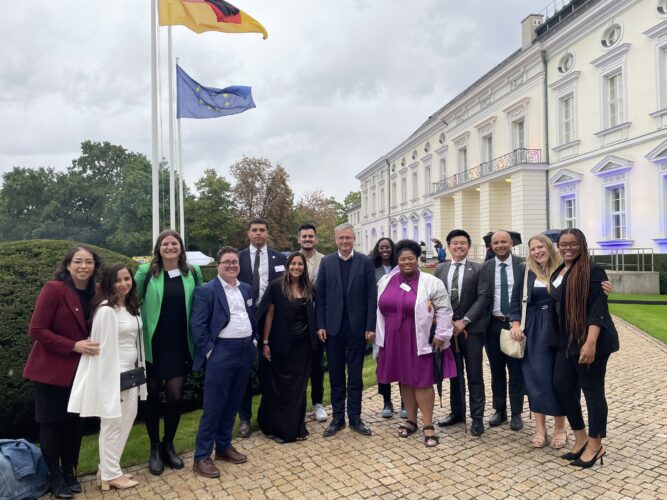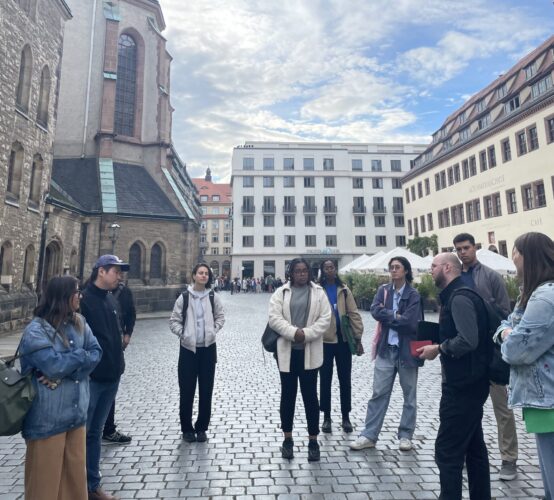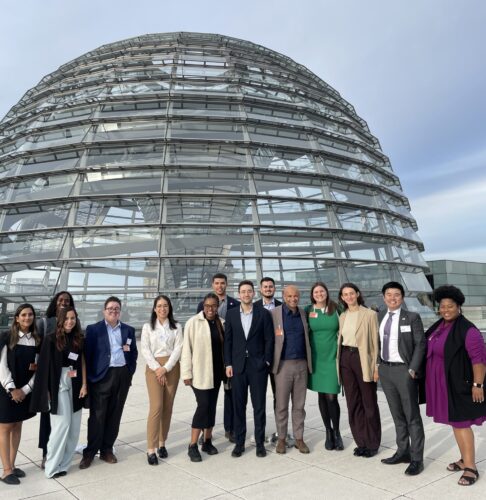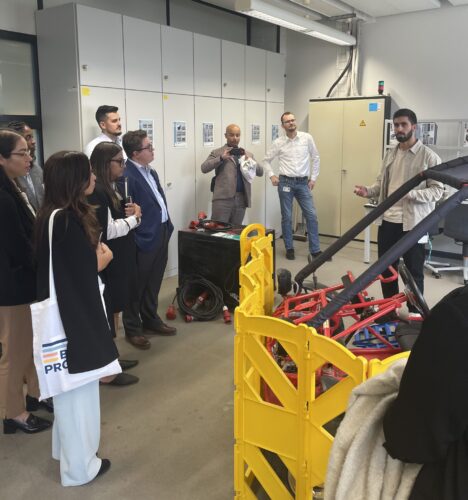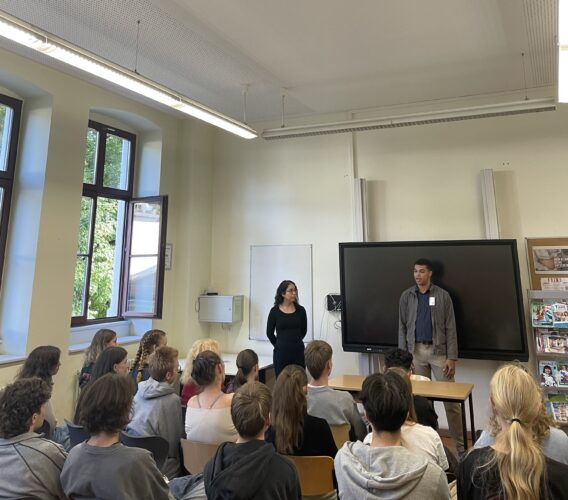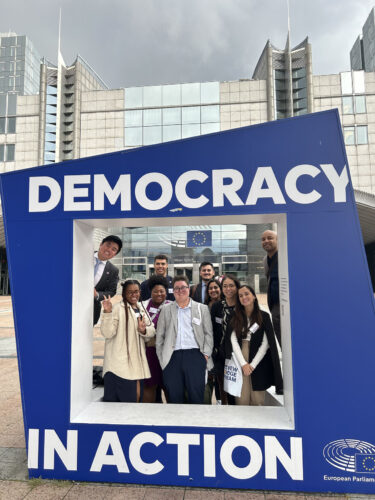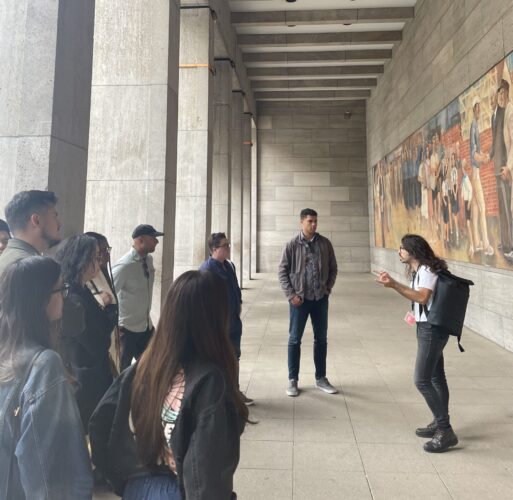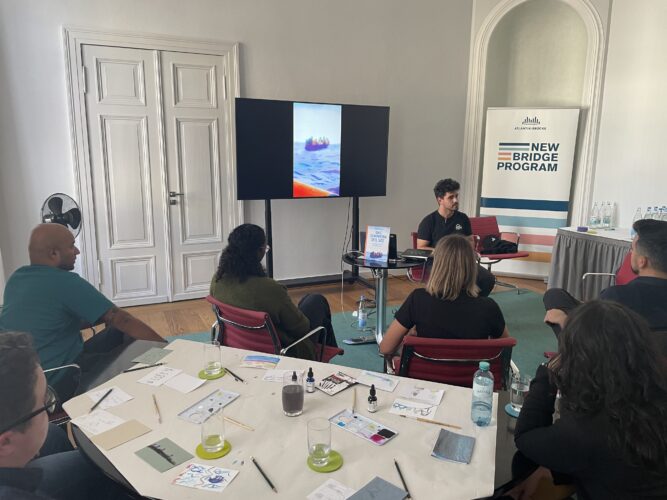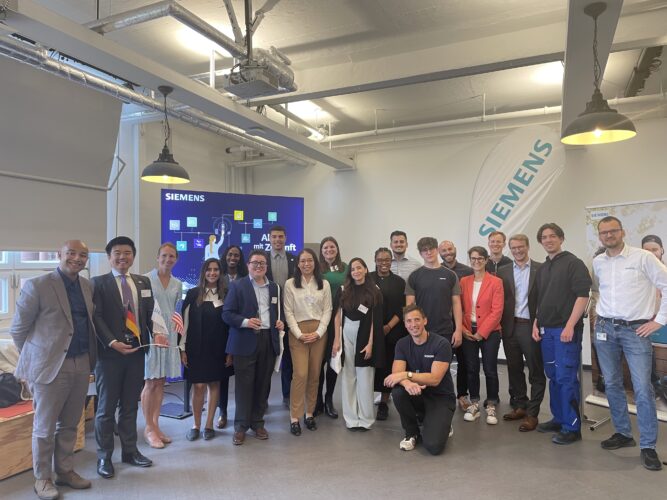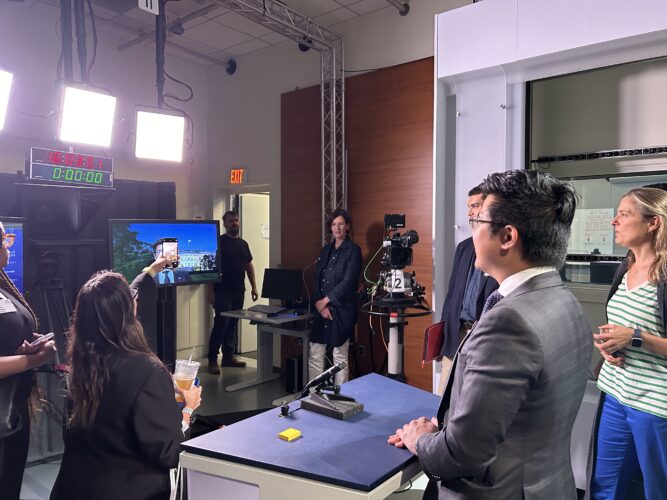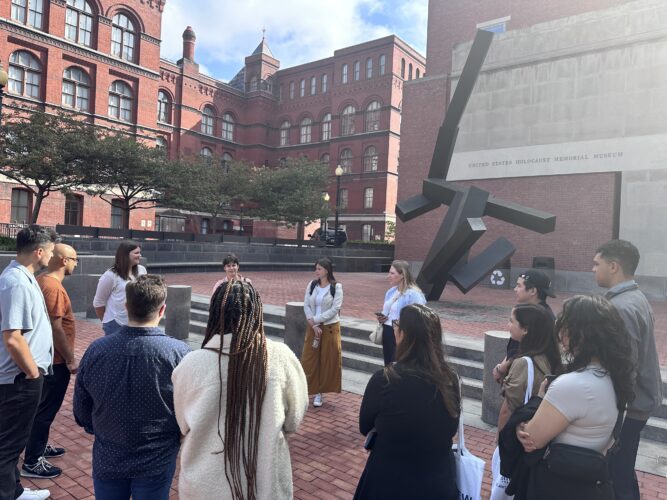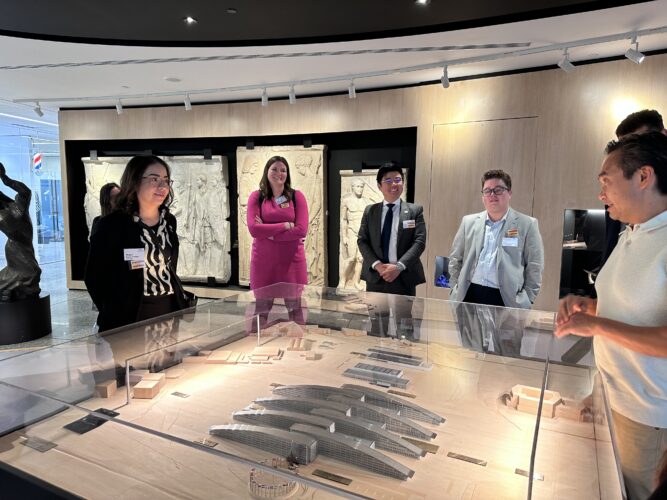New Bridge to Germany: Collaborative solutions in need
By Janhvi Bhojwani, Sameer Rao and Samantha E. Williams
In September 2024, the New Bridge Program (NBP) convened ten changemakers from across the U.S. to add voices from marginalized groups to transatlantic discussions surrounding economics, migration, misinformation in the news, and security. The cohort engaged with top officials, scholars, journalists, activists, students and others actively shaping German and European politics and culture. Together, these individuals painted a comprehensive picture of how, from halls of power to city streets, Germany’s past and present inform its and the United States’ future.
The trip unfolded against a backdrop of rising nationalism and anti-immigrant sentiment, highlighted by the far-right Alternative for Germany’s (AfD) ascendance in several state elections. The country simultaneously implemented stricter border controls, challenging the Schengen Agreement’s principle of open borders. Meanwhile, the looming U.S. presidential elections became a focus, with implications for trade, alliances, and energy resources.
German relations’ stateside dimensions
The ten-day journey began in Washington, D.C., with a comprehensive overview of German history and its intricate ties to the U.S. The day after an introductory happy hour with NBP alums, Georgetown Universty Professor Dr. Jeffrey Anderson identified for cohort members three critical periods (WWI, WWII, and the rise and fall of the Berlin Wall) when Germany confronted its identity, unity, and role on the global stage. A lunch discussion with Axel Dittman, Deputy Chief of Mission at the German Embassy, illustrated Germany’s commitment to modernity. Dittman emphasized the importance of strong relationships with the U.S. and communities with fewer German touchpoints, such as the heartland and South.
At public broadcaster ARD’s D.C. studio, fellows explored the implications of local German elections on transatlantic relations. Rising nationalism in both nations is primary concern among journalists, who examined parallels in state-level dynamics. A poignant visit to the Holocaust Museum and meeting with the German Historical Institute experts facilitated difficult reflections on historical injustices. Notably, NBP fellow Ashley Hodges, a DEI leader for the Atlanta Mayor’s Office, ushered the group during a mindful debriefing as the cohort highlighted the treatment of Germany’s Jewish population and indigenous, Black, and Brown communities in the U.S.
The transatlantic relationship on the international stage
Once in Brussels, the group spoke to NATO and U.S. State Department staffers about the alliance’s role in global security. American officials honed in on the message of unity through strength, citing NATO and its 32 constituent nations’ around-the-clock efforts to maintain peace and collective defense preparations. A trip highlight for all was a private tour of NATO’s expansive campus led by Nick Nguyen, Head of the Public Disclosure Unit for NATO Archives. While the U.S. and Germany have the two largest missions to NATO, even the smallest delegation is needed for action to be taken, leading to robust debate that enables members’ lock-step decision-making.
The cohort then explored the transatlantic alliance’s political dimensions with Free Russia Foundation’s Brussels Director Roland Freudenstein, who briefed fellows on the European Union’s (EU) history and governance structures. These lessons, from an organization caught in the Ukraine-Russia conflict’s destabilizing aftershocks, prepared fellows for their subsequent visit to the European Parliament (EP). There, the cohort saw NBP fellow Chase Phillips, Executive Advsior to the Mayor of Denver, Colorado discuss the far-right, BRICS alliance and artificial intelligence in misinformation with Sergey Lagodinsky, a German EP representative with The Greens political party.
Germany’s history, economy, politics and education, front-and-center
Upon arriving in Germany, fellows took a walking tour of Berlin, with notable landmarks like the Berlin Wall, Holocaust Memorial and approximate area above Adolf Hitler’s bunker offering deeper understanding of the nation’s history. Fellows then went to Atlantik-Brücke headquarters, where sea rescuer and graphic novelist Adrian Pourvisehled an interactive session on the European migration crisis. It sparked a powerful conversation on the complexities of migration in the Mediterranean, as well as the comparison between Europe’s migration landscape and the United States’.
A briefing on Germany’s political system by Dr. Matthias Roßbach, the Head of the Representation of the State of North Rhien-Westphalia to the Federal Government, laid the foundation with an engaging conversation on the differences between German and U.S. government structures, the perceptions and limitations of local and federal laws, and the election systems of both countries. Fellows got to exchange thoughts and opinions surrounding voting structure in the both countries, as well as the misinformation landscape and varying trust in both elections system.
A trip to multinational technology giant Siemens yielded a solid understanding of Germany’s dual education system, via a presentation where fellows learned about the different educational paths German youth can take, as well the hands-on dimensions of vocational tracks. A tour of the Reichstag with Innokenty Burshteyn and Rita Lieder, a pair of NBP alums and political advisors to the FDP Parliamentary group, brought the prior talk to life through visits to different party rooms and walking the Bundestag halls. Cohort member Alex Schyllander, Senior Manager of Global Advocacy at the Human Rights Campaign, further explored these structures and navigating the anti-gender movement in conversation with Nyke Slawik, a Bundestag representative for The Greens and the legislative body’s first trans woman lawmaker.
The chance to dine with Fridays for Future activists Helena Marschall and Zahra Pischnamazzadeh illuminated climate issues in Germany and how movement-building compared to the United States. While in Germany, the cohort also got to taste popular local and regional delicacies such as currywurst and döner — both of which, like Tex-Mex food or pizza in the U.S., show how immigrants and their descendants contribute to national identity.
From East German streets to the global stage
The program’s last two days put everything the cohort learned beforehand into sharp relief. First, cohort members visited Leipzig, the largest city in Saxony, where recent state elections gave AfD over 30% of vote.
The day’s programming started at the esteemed St. Thomas School. A mix of students and educators at one of the world’s oldest schools, including members of its acclaimed boys’ choir, gave the group a fuller picture of Germany’s multi-tiered educational system. This included a tour of the school’s facilities, a student’s presentation on the German educational structure and coffee chats with several teachers and pupils. In turn, NBP fellows Maggie Salas Crespo, a co-managing partner of NReal Media Strategies and former Deputy Secretary of State for Southern Nevada, and Chase Phillips taught students about U.S. electoral processes. Building off their expertise in local government in Nevada and Denver, Colorado, respectively, the pair engaged students in discussions about the recent elections and the coming U.S. one.
These topics also grounded visits to the Amadeu Antonio Stiftung and University of Leipzig, where experts like Debunk program leaders Marie Künne (an NBP alumna) and Benjamin Winkler and Dr. Rebecca Patesdiscussed the AfD’s roots in post-unification issues and current misinformation campaigns.
Leipzig’s history and present grew sharper with NBP alum and doctoral student Mario Futh’s tour of historic sites (including where the Monday demonstrations helped bring the German Democratic Republic to an end), along with his and Stiftung Bürger für Bürger staffer Walter Grunt’s explanation of how local activists and communities of color organize to resist the far-right’s embedded place in German politics.
Bringing it (to the president’s) home
The cohort’s final day in Berlin more fully illustrated the transatlantic exchange as it stands today. Members returned to Atlantik-Brücke for a final debrief led by cohort member and Venture Café Miami director Alejandra Silva. Later, Bronx native Dr. Nakeema Stefflbauer took cohort members through a conversation on her multifaceted approach to diversity, equity, and inclusion (DEI) in Berlin’s tech sector, from training migrant women in technical skills to teaching DEI at local meetups. She also discussed Americans of color’s positionality in Germany, where Black Americans may be seen as American first and accorded privileges African migrants don’t get.
After a conversation with Atlantik-Brücke CEO Julia Friedlander, cohort members attended a panel and conversations around identity, transatlantic relations and DEI. Together, these conversations brought the nuanced and often difficult but also joyous aspects of community-making among marginalized peoples in Germany and the US into the spotlight.
The conversations carried all the way to the fellows’ capstone event in a center of cultural power: the Schloss Bellevue and adjoining Bundespräsidialamt, where fellows discussed the myriad of topics they learned about the prior week with Ministerial Director Dr. Oliver Schmolke of the Office of the Federal President. This conversation’s textures of critique and hope also pervaded German President Frank-Walter Steinmeier’s Bürgerfest’s speech.Touching on recent events like a suspected attempted attack on the Israeli consulate in Munich, Steinmeier made a passionate plea for what joyous gatherings can do for a population.
At this time, we need light-hearted, happy moments from which we can draw strength. … And we need inspiring encounters that encourage us to stand up for a more just and peaceful future.
“At this time, we need light-hearted, happy moments from which we can draw strength. And we need inspiring encounters that encourage us to stand up for a more just and peaceful future.” Steinmeier and First Lady Elke Büdenbender said in a printed program note that evoked the themes of his speech. The cohort’s experiences leading up to this grand evening on the castle grounds, with guests of honor President William and First Lady Rachel Ruto of Kenya, frequently contrasted with the Bürgerfest’s dream-like atmosphere. And that’s symbolic of the New Bridge experience at large: a crash course in what two complex nations with inextricable histories can learn from one another.
As Germany and the US each wrestle with these inseparable pasts that enabled present political, civil, economic, and military crises, they both must look to their present realities — of real equity, critical reflection and the hope for a better future — to ensure pressing questions about transatlantic relations gets answered.
New Bridge to Germany is supported by the Transatlantic Program of the Federal Republic of Germany, funded by the European Recovery Program (ERP) of the Federal Ministry for Economic Affairs and Climate Action (BMWK), and by the Joachim Herz Foundation.

